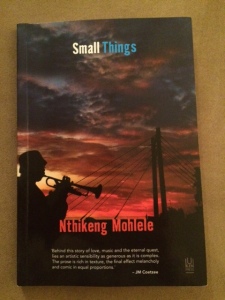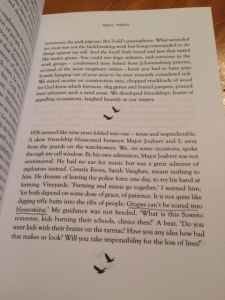How do I even begin to describe this jewel of a novel? Small Things is an almost poetic meditation that documents the musings and reflections of a man who was born in Sophiatown before it was dismantled and now finds himself in his sixties and unable to contend with the demise of principle.The setting is Johannesburg then and now.
It is perhaps more a novella than a novel with the intensity of 500 pages condensed and concentrated into 108 pages. The contemplations of this nameless man are profoundly simple yet achingly fashioned with beautiful language. As I closed it on the last page all I wanted to do was read it again.
It is almost serendipitous that I selected this as my next book to read after The Textures of Silence because it is also partly set in pre-democracy days. It is a very different novel but also speaks to the theme of the fall from grace of our current government, compared to the values of the struggle days. It is a window into the shadowy corners of the mind of a man whose very being has shifted into inertia; partly due to the dehumanisation he experienced after 18 years of incarceration during the apartheid years.
The preface sets the tone for the novel as the reader is introduced to the unusual thought processes of the protagonist who constantly questions his own suppositions; he does not think “much of life” but is “never sure if this conclusion is without some blemish, some residue, however faint, of an ounce of madness”. Then we are plunged into his love for Desiree, the postmaster’s daughter, who never fully requites his eternal love for her but is drawn to him. Time skips along and sometimes the timelines are a little confusing. He grows up in a catholic orphanage, writes outspoken newspaper articles and is then incarcerated for eighteen years in the early seventies where Major Joubert tortures him relentlessly. He describes Major Joubert as “a skinny man of average build, clean-shaven with a pleasant smile; more suited for packing watermelons and tomatoes in supermarkets than hunting down rebels”. This description simultaneously evokes a notion of his sense of superiority over his captor while underscoring the chillingly ordinary face of evil.
Upon his release, he is homeless, lives on the streets with pigeons as company, (I love the bird icons that separate sections – see pic) and is often drawn to the Nelson Mandela Bridge. Here a Dark Figure attacks him. The remarkable thing is that although left for dead, he refuses to assist the police. From his point of view, he has no interest in “chasing ghosts”. He does not conform to society’s expectations, time and time again. This Dark Figure roams through the novel and seems to be a symbol of unexplained violence as much as he is a real person who kills.
He discovers Desiree again and she is as heartless as ever. He finds a job working as a guide in Soweto where he offers advice on memorable experiences but he cannot understand how overseas tourists “endure a fourteen-hour flight, come all the way to South Africa and request to view corpses”. Another theme in this book emerges when a former fellow prisoner who now heads the Ministry of Tourism offers him a “plush job”. He does not want it. He does not want to be important. He also does not want to be beholden. After so many years of incarceration, he does not want a different form of incarceration. He believes there is “a certain freedom, a peculiar reckless abandon that comes with not being important”. This theme brings Thando Mqolozana’s novel, Unimportance, to mind. Although it is a very different novel, it also addresses issues of principle.
Our man meets Mercedes who teaches him to play the trumpet. His relationship with Mercedes gives rise to many pronouncements on love and all its manifestations and meanings. The descriptions of lovemaking are wonderful; evocative without being explicit. Mercedes witnesses his tears in response to music and tells him that he is a “priceless gift to the universe” because his tears show the hidden talent of one who is “beyond musical scales, the one who plays hard to contain raging fires within”.
This man’s thoughts tug at my heart and create sorrow within me because of his life experience and his current disillusionment; the effect is far greater than if it had been manifest in the usual way; this man does everything the hard way; he believes he “can wrestle the universe into submission” in “lone pursuit of non-existent perfect worlds”. He sees himself as others see him and in so doing is harsh and cruel to himself; embittered yet not ready to give up his moral centre. He sees himself as a “dreamer, an average man overtaken by fate”. His most endearing quality is that he is true to himself no matter what.
This character has insinuated himself into my heart and into my mind. His decisions seem inexplicable but they make sense in the light of how he views himself and his life. Yet I do not even know his name. Nthikeng Mohlele has a special talent in his use of language and his ability to encapsulate enormous themes and distil them down to Small Things.


My that sounds so good! I can easily get this book electronically but it looks from your photograph that it would be nicer to have a paper copy (generally my preference). I will have to put it on my list because I have just booked a trip to South Africa for mid-June to early July. Much of the time I will be staying in a small village near East London, but I fly in and out of Cape Town and booked a room in an inn in Sea Point for my final week in the country. Hunting for books will be high on my agenda (I have my priorities).
I am so excited! I’m looking forward to an opportunity to unwind and put many miles between myself and the stresses of home life.
LikeLike
You will love this book. I am sure of it. i can’t wait to read his latest book,Rusty Bell. I think this man is supremely talented. The cover pic is great – epitomises the book. So wonderful you are coming to SA .wish you were coming to Durban. I’d love to meet you.
LikeLike
Before I leave I will get your email, should I make it up that way. It’s not entirely out of the question. East London is between the major centres and I really wanted to spend some time in Cape Town so it made the most sense to fly in and out of that city.
LikeLike
wonderful!
LikeLiked by 1 person
Penny, I’ve just read through every one of your posts on this blog, and I love them all! I know what an avid and thoughtful reader you are, and have been enthralled by your book reviews in person, but this is another level – just fantastic! I’m inspired to read a few of these great new South African books, starting with Small Things. Wishing you all the best from Hobart 🙂
LikeLiked by 1 person
Thank you, Michael. A real compliment coming from you. I do miss our reading group.
LikeLike
You have described the grip of this book so well! I love the allegory with the moth to the flame, another small thing. I did feel though, that the prose became richer and more fluid as the book neared the end. The beginning was a bit bewildering.
LikeLiked by 1 person
I think a novel that is not spelling everything out for the reader will often seem confusing and that’s ok if it coheres for you by the end. I also think the writer has a different approach to time, as if time and chronology are some how irrelevant. I find this very interesting
LikeLike